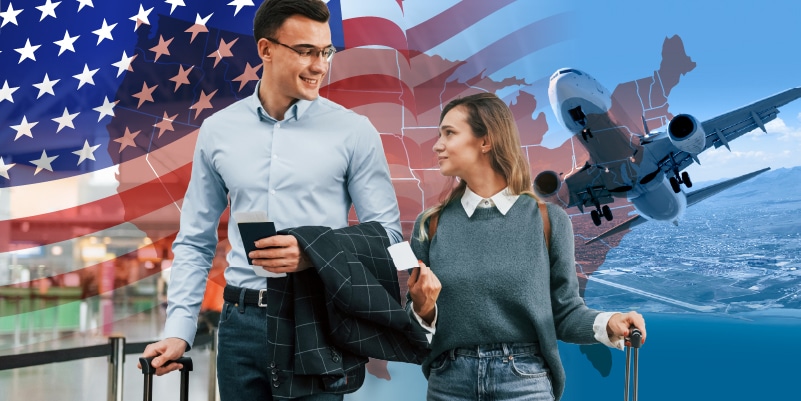
Traveling in and out of the United States is part of an EB-5 investor’s application experience, whether they are still in the application process or have recently received their temporary or permanent green card.
Some investors may already reside in the U.S. but wish to travel for business or leisure, while others are arriving for the first time after obtaining their temporary residency. They must be aware that traveling with a pending visa application involves specific considerations. This requires careful planning and compliance with immigration regulations.
“The law hasn’t changed but we have received confirmed reports of heightened scrutiny by CBP Officers, especially for those with a criminal record (even for misdemeanors and citations), those from countries on the travel ban list (like Iranians, Venezuelans), and those who travel internationally frequently,” says EB-5 attorney Calvin Azadi from Azadi Law P.A.
“If there’s a specific reason why you should consider not traveling, your Immigration attorney will usually point that out to you. Otherwise, if you have the right status and travel documents, you can still travel no matter where you’re from,” Azadi adds.
U.S. immigration attorney Jimena Cabrera of the Law Office of Jimena G. Cabrera dvises her clients to remain calm when interacting with immigration officers.
“While it is natural to feel intimidated, staying composed can significantly ease the process,” she said. “Also, I ask them to practice good phone hygiene and be mindful of the information they share and the security of their phone. Finally, I ask them to consider the impact of their social media posts, as they may be scrutinized,” she says.
How can EB-5 investors leave and return to the U.S. smoothly?
The travel experience can differ significantly for an EB-5 investor who already resides in the U.S. compared to someone traveling here for the first time.
While they can leave the U.S. for work or leisure without limitations, extended trips abroad can present risks. Being outside the U.S. for over six months may result in additional scrutiny upon reentry, and absences exceeding one year could lead to the abandonment of status.
According to Azadi, valid U.S. visa holders with a pending adjustment of status application for an EB-5 visa can still enter or exit the country without an Advance Parole (AP) document. However, “this requires them to continue working for the Employer that sponsored that visa and travel with proof of that, like a recent paystub,” in the case of H-1B holders.
Additionally, EB-5 applicants on single-intent visas, such as E-1/2, F-1/OPT, or B-1/2, cannot travel without an AP, their green card or its automatic extension while their I-829 application is pending.
Cabrera advises that those entering the U.S. with AP should ensure that their document is valid for the entire duration of their trip. “Additionally, I advise them to carry supporting evidence such as an original and a copy of their Employment Authorization Document (EAD) card, if issued separately, as well as their state I.D. or driver’s license, and receipt notices of any pending applications. Also, make sure that other necessary documents, such as their passport, are valid for at least six months beyond their travel dates.”
EB-5 lawyer Renata Duarte from R Duarte Law also recommends that visa holders using APs minimize the risk of being denied entry while their green card application is pending.
F-1 visa holders, in particular, face additional complexities when traveling after having filed Form I-485 to adjust their status to obtain permanent residency through the EB-5 green card. Many of these international students often apply for this visa while ending their studies and apply for AP as a backup for travel, even if their F-1 visa remains valid.
“A student who continues full-time enrollment, keeps SEVIS valid, and has a valid F-1 visa could, in theory, attempt to re-enter on F-1 status and remain a bona fide F-1 student, thus keeping the usual F-1 benefits (such as on-campus employment),” Duarte says.
But if the student has concurrently filed for the EB-5 visa and travels with a pending Form I-485, it signals potential immigrant intent.
“This can prompt U.S. Customs and Border Protection to question and possibly refuse admission under F-1. While it is legally possible that an officer may admit someone in F-1 status if convinced the traveler will depart if the green card application fails, the existence of a pending I-485 complicates that argument.”
Duarte points out that the moment students enter the U.S. using AP, they are classified as a parolee, meaning they no longer hold F-1 status, “even though the pending Form I-485 keeps them lawfully present. Those who do attempt to re-enter on F-1 must be prepared to address’s concerns regarding their immigrant intent.”
What EB-5 attorneys recommend for safe travel to investors?
U.S. immigration lawyers advise investors to be aware of their rights and responsibilities based on their immigration status to ensure a smooth travel experience. These include:
1. Carry valid documentation: This includes the temporary or permanent green card, when traveling in and out of the U.S. This documentation serves as proof of your legal status in the country and is crucial for reentry.
2. Prepare for increased scrutiny: U.S. immigrants may be prepared for potential questioning and ensure that your documentation is readily available for inspection.
5. Stay informed: Being informed and proactive can help you navigate potential challenges and ensure a smooth travel experience.
DISCLAIMER: The views expressed in this article are solely the views of the author and do not necessarily represent the views of the publisher, its employees. or its affiliates. The information found on this website is intended to be general information; it is not legal or financial advice. Specific legal or financial advice can only be given by a licensed professional with full knowledge of all the facts and circumstances of your particular situation. You should seek consultation with legal, immigration, and financial experts prior to participating in the EB-5 program Posting a question on this website does not create an attorney-client relationship. All questions you post will be available to the public; do not include confidential information in your question.








